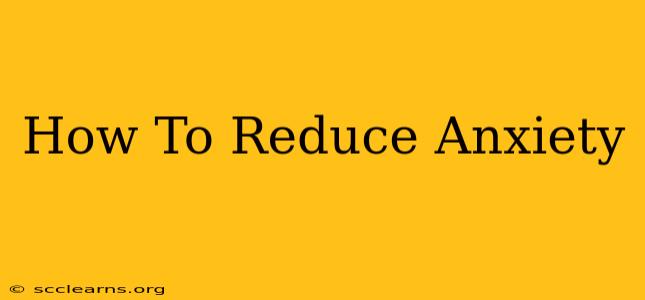Anxiety. That persistent feeling of unease, worry, and nervousness that can significantly impact our daily lives. Millions grapple with it, and finding effective ways to manage it is crucial for overall well-being. This comprehensive guide explores practical strategies to help you reduce anxiety and reclaim your peace of mind.
Understanding Your Anxiety
Before diving into solutions, it's important to understand the root of your anxiety. Is it situational, stemming from specific events or circumstances? Or is it a more generalized anxiety disorder requiring professional help? Identifying the source can help tailor your approach to anxiety reduction.
Identifying Triggers
Keeping a journal can be incredibly helpful. Note down situations, thoughts, or feelings that trigger your anxiety. Recognizing these patterns is the first step toward managing them. Common triggers include:
- Stressful events: Deadlines, financial worries, relationship issues.
- Social situations: Public speaking, large gatherings, meeting new people.
- Physical factors: Lack of sleep, poor diet, excessive caffeine.
- Underlying health conditions: Thyroid problems, heart conditions.
Practical Strategies to Reduce Anxiety
Once you have a better understanding of your anxiety triggers, you can begin implementing strategies to manage them. These techniques aren't a one-size-fits-all solution, but rather a toolbox you can draw from to find what works best for you.
1. Lifestyle Changes: The Foundation of Anxiety Reduction
A. Prioritize Sleep: Aim for 7-9 hours of quality sleep per night. A consistent sleep schedule is key. Avoid screens before bed and create a relaxing bedtime routine.
B. Nourish Your Body: A balanced diet rich in fruits, vegetables, and whole grains provides the nutrients your body needs to function optimally. Limit processed foods, sugar, and caffeine.
C. Regular Exercise: Physical activity is a powerful anxiety reducer. Even a short walk can make a difference. Find an activity you enjoy and stick with it.
D. Limit Alcohol and Caffeine: These substances can exacerbate anxiety symptoms. Moderate or eliminate your intake to see if it improves your anxiety levels.
2. Mindfulness and Relaxation Techniques
A. Deep Breathing Exercises: Simple deep breathing techniques can calm your nervous system in moments of anxiety. Inhale slowly and deeply, hold for a few seconds, and exhale slowly.
B. Progressive Muscle Relaxation: This technique involves systematically tensing and releasing different muscle groups to reduce physical tension associated with anxiety.
C. Mindfulness Meditation: Regular meditation practice can help you become more aware of your thoughts and feelings without judgment, reducing their power over you. Many guided meditations are available online or through apps.
3. Cognitive Behavioral Therapy (CBT) Techniques
CBT helps you identify and challenge negative thought patterns that contribute to anxiety. Techniques include:
- Cognitive Restructuring: Identifying and replacing negative thoughts with more realistic and positive ones.
- Exposure Therapy: Gradually exposing yourself to feared situations or objects to reduce avoidance behaviors.
4. Seeking Professional Help
If your anxiety is severe, persistent, or significantly impacting your life, seeking professional help is crucial. A therapist or psychiatrist can provide a proper diagnosis and recommend appropriate treatment, which may include therapy, medication, or a combination of both. Don't hesitate to reach out for support; you don't have to navigate this alone.
Maintaining a Calmer You: Long-Term Strategies
Reducing anxiety is an ongoing process. Maintaining a healthy lifestyle, practicing relaxation techniques regularly, and seeking support when needed are crucial for long-term well-being. Remember to be patient with yourself and celebrate your progress along the way. You deserve to live a life free from the overwhelming grip of anxiety.

